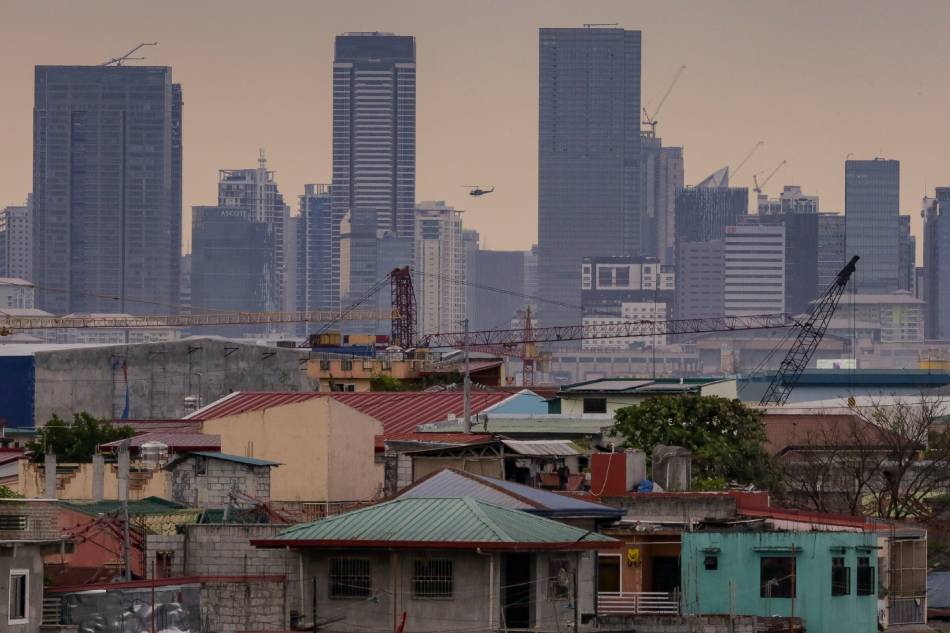Marcos says Philippines' debt-to-GDP ratio ‘worrying’ | ABS-CBN

Welcome, Kapamilya! We use cookies to improve your browsing experience. Continuing to use this site means you agree to our use of cookies. Tell me more!
Marcos says Philippines' debt-to-GDP ratio ‘worrying’
Marcos says Philippines' debt-to-GDP ratio ‘worrying’
Katrina Domingo,
ABS-CBN News
Published Aug 09, 2023 05:31 PM PHT
|
Updated Aug 09, 2023 06:02 PM PHT
MANILA — President Ferdinand Marcos Jr. on Wednesday said the Philippine government is “worrying” about the country’s debt even if the country is “doing better than its neighbors.”
MANILA — President Ferdinand Marcos Jr. on Wednesday said the Philippine government is “worrying” about the country’s debt even if the country is “doing better than its neighbors.”
The Philippines debt-to-gross domestic product ratio is “not ideal” Marcos told members of the US-ASEAN Business Council who visited Malacañang.
The Philippines debt-to-gross domestic product ratio is “not ideal” Marcos told members of the US-ASEAN Business Council who visited Malacañang.
“We worry about our debt-to-GDP ratio in the Philippines, as it stands at about 63 percent and that’s a little high for us and it is not ideal,” he said.
“We worry about our debt-to-GDP ratio in the Philippines, as it stands at about 63 percent and that’s a little high for us and it is not ideal,” he said.
The Philippines sovereign debt grew to a new record of P14.15 trillion at the end of June, according to data from the Bureau of Treasury. Since assuming the presidency last year, Marcos has added P1.36 trillion to the national debt.
The Philippines sovereign debt grew to a new record of P14.15 trillion at the end of June, according to data from the Bureau of Treasury. Since assuming the presidency last year, Marcos has added P1.36 trillion to the national debt.
ADVERTISEMENT
“We’re doing better than our neighbors perhaps but nonetheless, it's still something that we need to be looking at,” he said.
“We’re doing better than our neighbors perhaps but nonetheless, it's still something that we need to be looking at,” he said.
The Philippines is looking at improving its growth numbers to reduce that ratio, the President said.
The Philippines is looking at improving its growth numbers to reduce that ratio, the President said.
RELATED VIDEO
Marcos said he also “worries about the constriction of the economy by very high interest rates.”
Marcos said he also “worries about the constriction of the economy by very high interest rates.”
The Bangko Sentral ng Pilipinas has so far raised its benchmark rate to 6.25 percent from a record low of 2 percent last year, as it tries to curb inflation which hit a 14-year high in January.
The Bangko Sentral ng Pilipinas has so far raised its benchmark rate to 6.25 percent from a record low of 2 percent last year, as it tries to curb inflation which hit a 14-year high in January.
“This is something that we have to balance,” he said.
“This is something that we have to balance,” he said.
Despite these, the President underscored that the Philippines continues to register positive economic numbers.
Despite these, the President underscored that the Philippines continues to register positive economic numbers.
“I am happy to report that the Philippines is on track not only for economic recovery but to achieving an upper-middle economic status within a couple of years,” he said.
“I am happy to report that the Philippines is on track not only for economic recovery but to achieving an upper-middle economic status within a couple of years,” he said.
“Despite global economic headwinds, our GDP post-pandemic defied predictions through sound economic and fiscal policies, responsive reforms, and an enabling economic environment that drove commerce and domestic consumption,” he said.
“Despite global economic headwinds, our GDP post-pandemic defied predictions through sound economic and fiscal policies, responsive reforms, and an enabling economic environment that drove commerce and domestic consumption,” he said.
Despite international headwinds, the Philippines has been doing “reasonably well” when it comes to economic growth, the President said.
Despite international headwinds, the Philippines has been doing “reasonably well” when it comes to economic growth, the President said.
“In the estimate of the World Bank, originally for the Philippines was 5 percent. Growth for this year, that has been upgraded to 6 percent,” he said.
“In the estimate of the World Bank, originally for the Philippines was 5 percent. Growth for this year, that has been upgraded to 6 percent,” he said.
“There are new shocks that have come in, but I think we can take measures to continue the growth rate of our economy,” he said, noting that “aggressive infrastructure projects” have been started in the country.
“There are new shocks that have come in, but I think we can take measures to continue the growth rate of our economy,” he said, noting that “aggressive infrastructure projects” have been started in the country.
While inflation in the Philippines has been on a downward trend since January, the country needs to achieve a 3.7 percent average inflation rate for the next five months for the country to hit the BSP's’ forecast of 5.5 percent inflation for 2023, Assistant National Statistician Rachel Lacsa said last week.
While inflation in the Philippines has been on a downward trend since January, the country needs to achieve a 3.7 percent average inflation rate for the next five months for the country to hit the BSP's’ forecast of 5.5 percent inflation for 2023, Assistant National Statistician Rachel Lacsa said last week.
Read More:
GDP ratio
business
President Ferdinand Marcos Jr
debt-to-GDP ratio
sovereign debt
national debt
economy
economic growth
GDP growth
ADVERTISEMENT
ADVERTISEMENT


